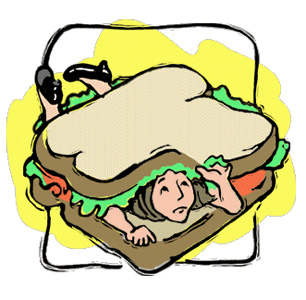
Do You Belong to the Sandwich Generation?
No, this does not refer to folks who “brownbag” their lunches. Rather, it pertains to one in every eight Americans who is both raising children and caring for an aging parent. It is estimated that 8-10% of these individuals are currently full-time employees. The math is simple — many of us in our 40s, 50s and 60s are still caring for teens while our parents, who are 70 and beyond – may be becoming more dependent on us, thereby “sandwiching” us between two competing sets of responsibilities. The stress of these situations can become overwhelming, particularly for employees who need to maintain productivity and high performance in spite of the demands they are constantly addressing. The following ideas have been advanced by dependent care experts to assist the sandwich brigade:
- Consider the positives. Whenever three generations live under one roof, the very young will have golden moments with their elders that they will one day cherish! The children may learn some family history from their own grandparents as well as valuable life insights.
- Financial pooling: If elderly relatives move in on a permanent basis, there may be an opportunity to blend financial resources that will benefit the entire family unit.
- Maintain perspective: Even though it may seem that a role reversal has taken place – you are not your parent’s parent. When parents and children mistakenly fall into this trap, anger, resentment and confusion can result. You are helping your aging parents – not exchanging roles.
- Make plans together: Should the elderly sell their home? Permanently change their legal residence? Permit the younger generation to access checking and savings accounts? There will be much more “buy in” to these changes if everyone is included in the discussions.

- Share fears and concerns: Caregivers often become the sole engineers of any changes in the family structure. But it’s important that all family members have a voice. For example, the elderly person may worry about “being in the way” or losing contact with current friends. On the other hand, children may have concerns that mom and dad may become too preoccupied and busy to attend sports events or school activities.
- Recognize the difference between caring and doing: Sometimes we can demonstrate that we care by allowing our elders to perform tasks they can still perform. This can bolster their sense of self-esteem and dignity while lightening our load.
- Take care of yourself: Caring for multiple generations is emotionally draining. Don’t hesitate to reach out to your EAP for support, ideas and solutions. Counselors are available 24/7 to discuss your situation confidentially.
1.800.252.4555 or 1.800.225.2527
View more newsletters at www.theEAP.com
